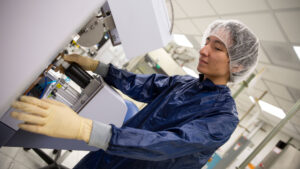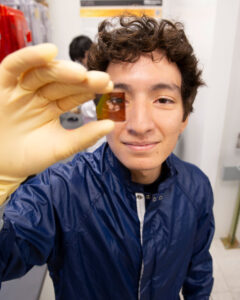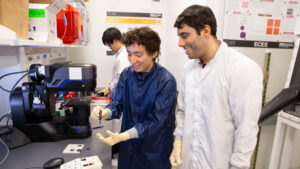Daniel Eduardo Abreu
Electrical engineering
Hometown: Chandler, Arizona, United States
Graduation date: Spring 2025
FURI | Fall 2024
Quantifying Elemental Diffusion Within Semiconducting Diodes Due to Thermal Stresses
This research aims to find a new way of characterizing material diffusion caused by aging within semiconductor devices. Glass slides coated with oxide-based semiconductor materials are aged via high temperatures to see how the composition of the samples changes over relatively extended periods of time. Elemental diffusion and relative composition of the material are measured using Glow Discharge Optical Emission Spectrometer (GD-OES) and diode properties are measured with capacitance-voltage scans. Additionally, results between aging in air and aging in nitrogen gas will also be compared.
Mentor: Nick Rolston
Featured project | Fall 2024

Electrical engineering senior Daniel Abreu was interested in expanding his skills outside his major’s typical curriculum and learning something practical, so he joined the FURI program. Under the guidance of Nick Rolston, an assistant professor of electrical engineering, Abreu is looking for a new way to interpret and understand material diffusion — a factor in the aging process of semiconductor devices. His project, which he has been working on since spring 2024, is sponsored by the semiconductor foundry TSMC. Sponsorship provides additional funding for undergraduate students to conduct exceptional semiconductor-related research.
Why did you choose the project you’re working on?
I have always been curious about semiconductor materials, especially since that has been the buzzword for the past decade, and even more so in the past two years or so. Materials classes are fairly far into the electrical engineering degree, so this program was a great way to get some early experience that I wouldn’t have normally gotten so soon.
How will your research project impact the world?
I want to see if there is a new way to characterize aging in semiconductor materials that hasn’t been used yet. Hopefully, this will aid in finding new perspectives to take into account when manufacturing semiconductor materials.
Have there been any surprises in your research?
Last semester, when trying to find relationships in material diffusion, some results were a bit unusual compared to other research projects. The plots are supposed to be largely linear and are used to help calculate donor densities throughout a material. This semester we are taking strenuous measures to make sure that discrepancies due to human error aren’t present and instead trying to narrow down and see if the discrepancy is due to the materials or the aging process.
How do you see this experience helping with your career or advanced degree goals?
The practical experience this program has given me has been a good talking point with recruiters when looking for internships. At a recent career fair, some recruiters have asked me about my experience in this research so it was nice being able to talk about the ins and outs of this project and what I learned from it.
What is the best advice you’ve gotten from your faculty mentor?
The best advice I have gotten from my mentor is to always be flexible when performing research. For example, going into an experiment, we might have a preconceived notion of how results should look, but we might get results that are unexpected. In these situations, my mentor reminds me to look at the research from a different angle or remove preconceived notions to consider something that may not have been taken into account going into an experiment.
Why should other students get involved in FURI?
I think other students should get involved with this program because it allows undergrads to better connect with professors, PhD students and other fellow students as well. I think it’s also a great way to get some practical experience that might not otherwise be offered in a traditional class.
Sponsored project | Fall 2024
Daniel Abreu’s FURI project is sponsored by TSMC.
TSMC is a global leader in the semiconductor foundry business. The company’s industry-leading process technologies and portfolio of design enablement solutions help its customers and partners unleash semiconductor innovation. With its recent expansion into Phoenix, TSMC sees the benefit of a strong partnership with ASU faculty and student researchers. TSMC supports the FURI program by providing additional funding for exceptional research projects related to the semiconductor industry. FURI student researchers who pursue a project related to the Semiconductor Manufacturing research theme are eligible for this sponsorship. TSMC-supported FURI students receive a $2,600 stipend and $400 to use for materials. Exceptional research proposals that align with the research theme of Semiconductor Manufacturing will be considered for this additional funding.


